Filter by
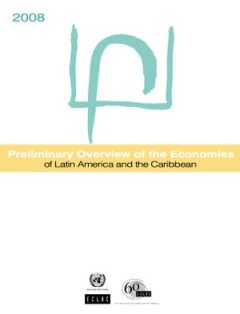
Preliminary Overview of the Economies of Latin America and the Caribbean 2008
With annual economic growth for Latin America and the Caribbean being projected at 4,6%, 2008 will mark both the sixth consecutive year of growth and the end of a period which has very few precedents in the economic history of the region. Between 2003 and 2008, regional GDP growth averaged nearly 5% per year, with per capita GDP increasing by over 3% per annum. This growth was coupled with impr…
- Edition
- -
- ISBN/ISSN
- 9789211216844
- Collation
- -
- Series Title
- -
- Call Number
- 650
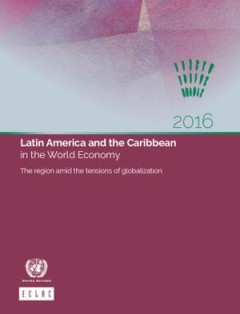
Latin America and the Caribbean in the World Economy 2016 : The region amid…
The 2017 edition of Latin America and the Caribbean in the World Economy reviews international and regional developments from a trade perspective, describing the principal global economic trends and structural changes in international trade, the main areas of trade growth and the changes these drive in the region.
- Edition
- -
- ISBN/ISSN
- 9789211219333
- Collation
- -
- Series Title
- -
- Call Number
- 650
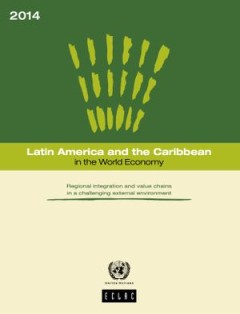
Latin America and the Caribbean in the World Economy 2014 : Regional integrat…
The 2014 edition of Latin America and the Caribbean in the World Economy: Regional integration and value chains amid challenging external conditions has four chapters. Chapter I examines the main features of the international context and their repercussions for world and regional trade. Chapter II looks at Latin American and Caribbean participation in global value chains and confirms that the r…
- Edition
- -
- ISBN/ISSN
- 9789211218688
- Collation
- -
- Series Title
- -
- Call Number
- 650
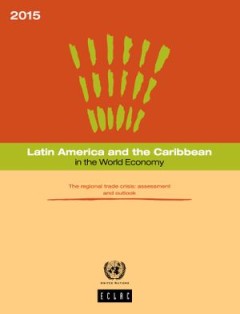
Latin America and the Caribbean in the World Economy 2015 : The regional trad…
With external conditions sluggish and highly uncertain as the global economy still struggles to shake off the effects of the economic crisis of 2008-2009, the Latin American and Caribbean region is not isolated from these effects and is projected to record a small drop in gross domestic product (GDP) in 2015, followed by a weak recovery in 2016. Against this backdrop, 2015 will be the third con…
- Edition
- -
- ISBN/ISSN
- 9789211219012
- Collation
- -
- Series Title
- -
- Call Number
- 650
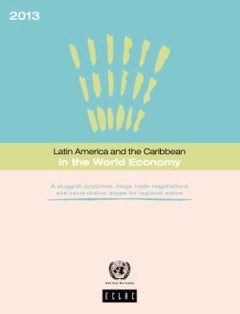
Latin America and the Caribbean in the World Economy 2013 : A sluggish postcr…
The 2013 edition of Latin America and the Caribbean in the World Economy is subtitled “A sluggish postcrisis, mega trade negotiations and value chains: scope for regional action” and is made up of three chapters. Chapter 1 reviews the main features of the persistently weak global economy and lacklustre world trade and then turns to global and regional trade trends and prospects. Chapter II …
- Edition
- -
- ISBN/ISSN
- 9789212211169
- Collation
- -
- Series Title
- -
- Call Number
- 650
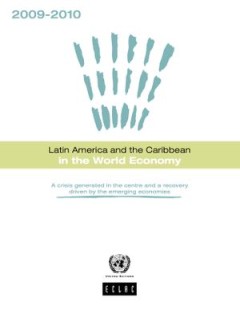
Latin America and the Caribbean in the World Economy 2009-2010 : A crisis gen…
The 2009-2010 edition of Latin America and the Caribbean in the World Economy, which discusses the crisis generated in the developed world and the recovery driven by the emerging economies, is divided into five chapters. Chapter I undertakes a short- and medium-term analysis of the post-crisis international economic situation, concentrating on its implications for international trade prospects …
- Edition
- -
- ISBN/ISSN
- 9789211217421
- Collation
- -
- Series Title
- -
- Call Number
- 650
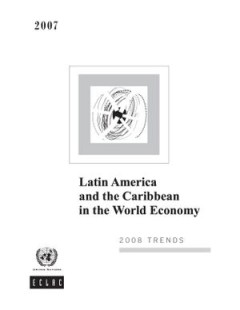
Latin America and the Caribbean in the World Economy 2007 : 2008 trends
This year's edition of Latin America and the Caribbean in the World Economy is divided into seven chapters. Chapter I contains an analysis of recent trends in the main industrialized and emerging economies and reviews the possible impact of the financial crisis that began in the United States on the world economy and on the economic and trade performance of Latin America and the Caribbean. The …
- Edition
- -
- ISBN/ISSN
- 9789211216769
- Collation
- -
- Series Title
- -
- Call Number
- 650

Environmental and Social Justice in the City; Historical PerspectivesEnvironm…
The world is full of environmental injustices and inequalities, yet few European historians have tackled these subjects head on; nor have they explored their relationships with social inequalities
- Edition
- -
- ISBN/ISSN
- 9781874267614
- Collation
- -
- Series Title
- -
- Call Number
- 307.3

Environment, Development and Change in Rural Asia-Pacific
This volume examines the economic, political, social and environmental challenges facing rural communities in the Asia-Pacific region, as global issues intersect with local contexts.
- Edition
- -
- ISBN/ISSN
- 9780203967843
- Collation
- -
- Series Title
- -
- Call Number
- T 338.95 CON e

Entwicklung und Pilotierung eines adaptiven Multistage-Tests zur Kompetenzerf…
In der aktuellen Kompetenzforschung werden diverse komplexe Konstrukte erfasst.
- Edition
- -
- ISBN/ISSN
- 9783832553319
- Collation
- -
- Series Title
- -
- Call Number
- T 371.12 BRU e
 Computer Science, Information & General Works
Computer Science, Information & General Works  Philosophy & Psychology
Philosophy & Psychology  Religion
Religion  Social Sciences
Social Sciences  Language
Language  Pure Science
Pure Science  Applied Sciences
Applied Sciences  Art & Recreation
Art & Recreation  Literature
Literature  History & Geography
History & Geography